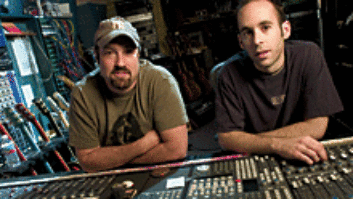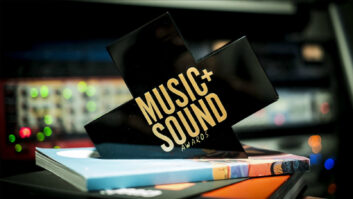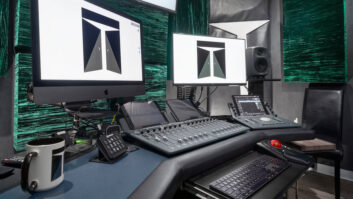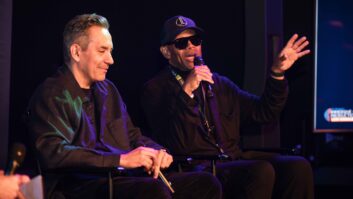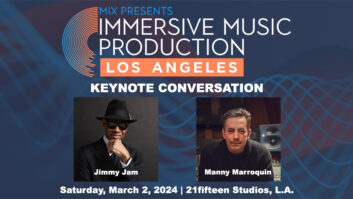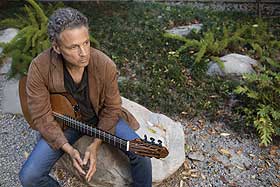
Photos: Jeff Gros
When Lindsey Buckingham and I hook up by phone one morning in the late fall of 2010, he apologizes for sounding tired, noting, “We did this corporate in Phoenix two nights ago and I got in late from that and I have kids who wake up at six in the morning.” The “corporate” was essentially a large private party, and “we” is Fleetwood Mac. When I express surprise that Fleetwood Mac would play that sort of gig—after all, the re-formed band (sans Christine McVie) has been touring (if sporadically) very successfully in big arenas—he replies, “Well, we’re living in the new world of the music business and we’ve got this little window, so there’s no reason not to,” and you can almost hear the shrug on the other end of the line.
Buckingham and I were speaking because it had just been announced that he would receive this year’s Les Paul Award at the 26th annual Technical Excellence & Creativity (TEC) Awards, held January 14, 2011, at the Anaheim Hilton, in conjunction with the NAMM convention. The Les Paul Award honors musicians “who have set the highest standards of excellence in the creative application of audio technology”—a description that certainly applies to Buckingham. Best known for fronting Fleetwood Mac on and off for the past 35 years, and writing and singing many of their best tunes, Buckingham has also made a handful of intriguing, somewhat idiosyncratic, solo albums; in fact, another one, tentatively titled Seeds We Sow, should be out in the not-too-distant future. From the beginning of his career, he’s been deeply involved in recording—he’s been cutting the new album in his home studio, engineering it himself. We thought this might be a good time to catch up with this restless and endlessly creative musical great.
Fleetwood Mac has become a “legacy band” at this point. Are you guys getting along okay?
You know, it’s been a long, emotional road with the band and I think we’re entering a time when we can appreciate each other in a way that was maybe not very likely for a number of years. A lot of it had to do with the hit-or-miss quality of how often we would even see each other. During those periods when we’re apart, everyone sort of goes through their own personal journey of making sense not only of what’s going on now, but what went on then. Maybe we’re better able to approach everything from more of an overview now. I think that’s where we are.
The last time we spoke, you had just finished Say You Will (Fleetwood Mac’s most recent album) and were about to go on tour. I’m wondering whether you still play material from it on the Fleetwood Mac tours you do. There were some good tunes on there, but no “hits,” I guess.
Let’s see, when we went out last year, we didn’t have a new album and we were going out and doing a body of work that we thought people would want to hear. And that’s something you come to terms with—that when you have been around long enough, there are a lot of songs people really want to hear and they are perhaps less interested in new material.
Sad but true.
Well, it isn’t really sad. For me, it’s like having the small movie and the big movie. You can do the solo stuff and it keeps you growing and it keeps you vital on certain levels, and then you can go out and work the big machine and actually just have fun with what that is and take it for what it is.
So the answer would be, no, on the last tour we didn’t do anything from that album because I think it didn’t fall into the preconception of playing what we thought people wanted to hear. On the tour before that, when we were actually supporting the Say You Will album, we did a few songs from that record.
You’ve been pretty prolific since then, putting out two very different solo albums—Under the Skin, which felt very personal and intimate, and then Gift of Screws, which showed a more raucous side.
Under the Skin has a very specific vibe, with all those acoustic textures and all that.
After we got done with the Say You Will tour, I said to the band, “Look, I want to take about three years, I want to do two solo albums if I can and tour behind both of them. So give me the time to do that and I can guarantee you I will come back into the fold with a renewed sense of community and a renewed sense of myself, which will hopefully bring something new into the mix.” And I did just that—that three-year period was a really positive time of growth for me, camaraderie with my own band and confidence-building. And it’s great to be out there playing for maybe 2,000 people and really connecting with the audience in a way that you can’t in a giant arena. I’m not knocking what we do with Fleetwood Mac. Those shows are really fun in a completely different way, and the level of connection with the audience is also certainly very special.

How did Under the Skin affect Gift of Screws, if at all?
Actually, I’m going through the same schizoid thing right now with the new album. Under the Skin didn’t really have lead guitar and was pretty much an acoustic-feeling album, whereas Gift of Screws was the opposite, and I think it was not just a reflection of my own sense of the range that’s there, but also a reflection of doing one [album] for me and one for… Well, as soon as I turned in Gift of Screws, Tom Whalley [now-departed CEO of Warner Bros.] called and said, “This is exactly the album we wanted before!”
“Thanks, I guess.”
[Laughs] “Glad you liked Under the Skin, man!” I don’t think they really “got” Under the Skin, to be honest, because they’re looking for things that somehow resonate with the Fleetwood Mac brand. And that’s kind of the onus under which you have to function—or not. I’ve done pretty well at undermining that over the years.
I can’t believe I just heard you say “Fleetwood Mac brand.”
Yeah, well, this is what we have to rail against to some degree. That was the psychology behind Tusk—taking what was clearly a point at which we might get branded and never be able to find our way out of that, and to pull the rug out from under it before there was a chance for it to take [root]. You could argue whether that was a wise choice or not. I was saying to Irving Azoff recently, “There are times I sort of kick myself around the block on a financial level for not working the franchise more.” But that’s the trade-off. I’m the person I want to be now, so I have no qualms about some of those choices. I think other people might have qualms about some of those choices.
But it’s not their life.
That’s exactly right.
Tell me about the new album.
It’s still coming together. I did it here at the house. When we got off the road with Fleetwood Mac last December [2009], I wasn’t really planning on making another solo album. I had a lot of ideas, but I didn’t necessarily feel the great urge to do that. And there was some talk about Fleetwood Mac continuing after the first of the year, but that didn’t come together, and suddenly I found myself with this time. At one point, I thought about doing shows where it would be a whole hour of just me doing what I do on guitar, and maybe at the end you bring out Brett [Tuggle, bassist in his solo band] and Neale [Heywood, guitarist] or something. I thought that might be something people would find interesting, so I was basing a lot of the approach on this album in a way that would resonate with that kind of show. Then, of course, as time went by, drums started to creep in on a few songs and it got more and more schizoid.
Are you playing the drums?
No, it was machine drums and some [Apple] GarageBand stuff. And then there is also Walfredo Reyes [Jr.], who was on our last tour; he played on a few things. Some of it, there’s no drums at all. Then, once you start playing little bits of things for people, they tend to gravitate to the tracks with drums, so I said, “Okay, I’m gonna hedge my bets here, make sure that I’m covered if that’s where this album wants to go.” I wanted to be open-minded. It may very well be an album that’s closer in spirit to Under the Skin, but in a slightly rawer way. But I’ve also got other things that have some lead guitar on them. It’ll be interesting to see how it comes out. But I think it could be as good as anything I’ve done in a while.
How does Say You Will [the most recent Fleetwood Mac album] sound to you now?
I have not listened to that album recently, but my intuition tells me that I was quite happy with how that album turned out. I cannot say it was as unified a piece of work as it could’ve been, and that was down to the fact that much of the material I had at the time had been, once again, slated to be a solo album—stuff I had done with Rob Cavallo. So there was a certain amount of deconstructing going on in order to make it work in a band context. From Stevie’s end, she wrote four new songs and then brought in a bunch of stuff that had been laying fallow for a while. I think you could sense a dividing line in terms of style with my songs that were not only new and a little bit edgy, but also a bit off the beaten track from the Fleetwood Mac style, as much as we tried to backtrack on it. So whether those two sets of material found any common ground… that would probably be the one thing I could criticize about the album. Having gone through a process that was a little problematic like that, I was happy with my stuff and the overall outcome of the album and the effect it had. I was pushing for it to be something a little more art-y and more chance-y, and it had elements of that and we folded it into one CD and made it what it was.
So, if you’re going to milk the Fleetwood Mac catalog, do you have somebody working to get a special episode of Glee with your music on it?
[Laughs]. Not that I know of, but that’s not a bad idea! There have actually been a few ideas about some kind of Broadway musical—jumping on the American Idiot bandwagon, I guess—but there’s nothing in the works right now.
Who’s doing your engineering these days for your new album, or are you doing it mostly yourself?
I’m afraid so. I have to plead guilty to that. [Laughs]
Is this Pro Tools HD and a bunch of cool boxes?
Some of that. But I’m also still doing some work on a reel-to-reel Sony 48-track, and even if I’m working in Pro Tools or whatever, I always like to mix it over to 2-track to get that tape sound. Then we’ll dump all the mixes into Pro Tools and get it ready to be mastered.
What are some of the things that are influencing your writing?
Well, it’s all guitar-driven, I guess. I’ve also been listening to a lot of college radio. About six months ago, I had to turn off KIIS-FM because my kids turned on the hip-hop songs and then it was the same ten songs over and over again. Then I started hearing Phoenix and being aware of that, and Vampire Weekend—a lot of groups where you’d hear one song and it would catch my ear. There’s actually a lot of great stuff going on. I don’t know who’s hearing it… I guess Phoenix has sort of pushed through, but a lot of these groups that seem to be doing interesting things, I wonder if more than 50,000 people are hearing them or not.
So, you’re in good company with this TEC Award you’re getting…
Yeah, I saw the list. It’s impressive… I’m not sure why I fit in with that group.
Well, because you’re a talented and successful musician who’s also always been interested in technology. Is it true you were doing your own recordings back as far as Buckingham Nicks?
Yes. When I was about 21 some relative I didn’t even know left me something like $10,000, so one of the things I did with that money was go out and buy an old Ampex half-inch 4-track—like the kind they recoded Sgt. Pepper’s on, I guess. At that time, my dad had this small coffee plant in Daly City [south of San Francisco]—they were coffee roasters—and at night I would go up there with Stevie, and a lot of times just by myself, and work on songs and demos. That machine then made it down to L.A. when we moved down there, and we had it downstairs where we were living, and some of work on the album we were making got done down there.
Of course that whole idea came from Les Paul originally. When I was maybe 19, I read how he had these two mono machines and he would play all this stuff himself and bounce it, and at that point I went out and got a Sony stereo consumer reel-to-reel recorder that had sound-on-sound, and that’s how I started recording myself and layering. Then it went to the 4-track and it on from there.
Was it surprising, then, when you finally made it into a real studio and there you are working with Keith Olsen, who obviously knew a ton?
It was an adjustment, for sure. There are certain quirky things you do when you’re doing it yourself which get lost in the mix in service of a bigger picture. That was a great experience when I look back on it now. I don’t think we were experienced enough to appreciate the fact that we’d only been in L.A. less than a year and we got a record deal. And here we are in the studio playing with [Elvis drummer] Ronnie Tutt and [bassist] Jerry Scheff and Jim Keltner. That was a pretty neat experience. And Keith, of course. I give him a lot of credit for his organizational skills for pulling together a situation that had to be done quickly on the first Fleetwood Mac album we did. That and the fact that he was a gifted engineer.
I didn’t know that album was done quickly.
Well, compared to Rumours…
Everything was quick compared to Rumours.
That’s true. But I mean it was done efficiently, and we’d rehearsed and pretty much chosen everything we were going to do before we went in to work with Keith. He did a very good job to pull together a group that had not really worked together before, and that was the case with the Buckingham Nicks album, too. He was a good overseer for both of those projects.
How does working on an album now, by yourself, compare to working on an album then?
I got into this thing where I was interested in pushing myself to learn how to work by myself in the studio. I wasn’t somebody who had seriously engineered, or mixed, but I wanted to look into these things to see how they enhance the overall, because—and I know I’ve told you this before—for me writing a song is something like painting. You go down there [to my home studio] and you’re dropping the colors on, and there’s a certain level of abstraction that goes on. Unless you’re a kind of Burt Bacharach-type person that brings a completed song in and hands it off to the next person to arrange it, and somebody else to play on it, then it’s all experimental as you go on a certain level, and what you start with may not be with what you end up with. With me, at the end of the day, I’m less a writer in the strict sense than I am a stylist. So I guess the idea of being alone in the studio and being involved with the mixing and the engineering, and the whole subsconscious thing, has branched out into being more important to the total process of making my music.
How often do you come up with lyrics and music at the same time at this point?
Not very often. Usually I’ll have a musical theme, and the way the lyrics seem to come these days is kind of a subconscious thing. I’m actually liking the lyrics I’m writing quite a bit, but they’re tending to be a little more abstract and less literal for sure—more of a Rorschach for whoever’s hearing them, which is a good thing.
Oh, you’re going through your Blonde on Blonde phase?
[Laughs] I guess, if you want to look at it that way. There’s a certain freedom in being able to come up with something which feels poetically interesting and right and doesn’t necessarily have to mean any one thing. I find that to be forward motion. A lot of times with lyrics, I’m not even sure what I’m going to say. I’ll start writing and little bits of things will come together from various takes and finally you arrive at something—“Okay, I see how that works, and it sounds musical,” and you build off it. I’m not a person who can sit down with a pen and paper and write a bunch of lyrics on a page.
Has the relative domesticity of your life affected your writing?
That’s a good question? I don’t know if I can be too objective about that.
Well, as long as you’re not writing songs like “Cook of the House” by Linda McCartney.
It’s probably only affected me in a small way. Being married and having a family have certainly provided more peace of mind, and more freedom to go down there [to the home studio] and think of that work as this linear, stable thing I do. For years, I saw so many people I knew who were parents and spouses who were just not there for their families. And it wasn’t necessarily their fault, but I guess we were all doing what we thought we had to do to be creative in that subculture, which turned out to be a load of bullshit, really. It’s very easy for me to reconcile the two worlds now. I can go downstairs and spend five or six hours a day working, or sometimes more, and come up and hang out with the family. In fact, the two actually help each other—the fact that I am fulfilled downstairs and I’m not coming home from some job I hate, and the kids are certainly intrigued by what I do… Although, I don’t think they want to follow in my footsteps particularly.
Do they like your music?
I think so. I know they like certain songs. Overall I think they think, “Yeah, it’s OK.” That would be my guess. [Laughs] It’s probably hard for them to be objective about it—after all, it’s dad. Maybe if they heard it on the radio they’d like it more. Like, right now my wife has a running CD of stuff from the new album and she’s been playing it for them in the car when she takes the girls out riding, and they sing along to it. I take that as a good sign.


